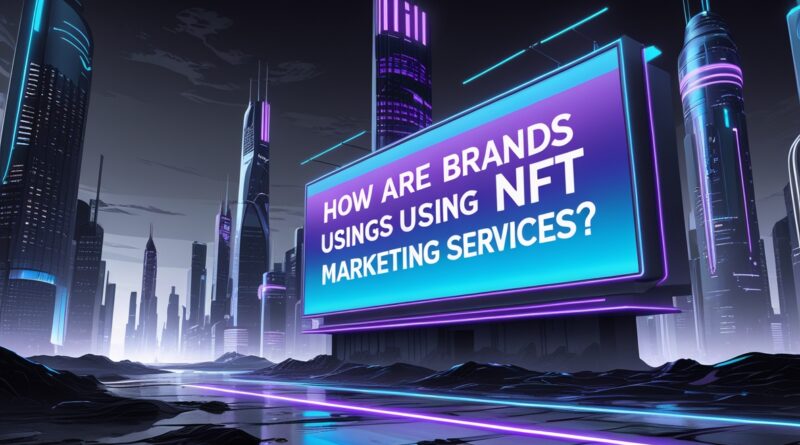How are Brands Using NFT Marketing Services?
NFTs, or non-fungible tokens, have gone from being a niche interest to a strong instrument that both consumers and businesses are interested in in just a few years. At first, NFTs were newsworthy because they were new, but now they are changing the way brands interact with their customers.
Businesses in many fields are using NFT marketing services to strengthen relationships, deliver one-of-a-kind experiences, and give customers digital assets that go beyond regular items. Brands are now selling not only products but also ownership, membership, and memorable experiences that help build loyalty and community.
Create value and communicate with customers, which changes the way marketing works in important ways. Let me show you some of the new and creative ways that brands are using NFT marketing services and talk about what this change implies for the future of marketing.
What Are NFT Marketing Services?
NFT marketing services include a variety of tactics and technologies that assist brands in making, promoting, and keeping track of NFTs in their marketing campaigns. These services cover everything from making unique NFT drops to building and running active digital communities around the coins.
NFT marketing can be broken down into several areas, including limited edition digital collectibles, gated content or exclusive access, loyalty rewards tied to NFTs, virtual or augmented reality events featuring NFTs, and partnerships with artists or influencers to make branded NFTs. Companies that offer these services generally help brands from the very beginning, when they come up with an idea, all the way through the launch and continued community participation after that.
They also help brands explain the unique value of NFTs to their target audience in a way that makes them more loyal, engaged, and effective in their marketing. This all-encompassing strategy helps marketers use the burgeoning NFT area to interact with their customers on a deeper level.
Why Brands Are Using NFT Marketing Services?
Brands are becoming more interested in NFTs because they can provide something that traditional marketing can’t: real digital ownership, scarcity, and a strong feeling of community. NFTs help brands develop close-knit communities by giving fans a place to engage with other fans in private groups.
FOMO makes limited edition NFTs exciting and important, which makes people want to get involved quickly. NFTs also work as digital access passes, giving holders exclusive benefits like access to events, products, or services that are only available to them. NFTs engage users and provide brands with valuable data by tracking ownership and usage.
Accepting NFTs also makes a brand look better by showing that it is innovative and ahead of the curve. These strong benefits are why so many brands are using NFT marketing to stand out and do well in marketplaces that are getting more and more competitive.
Top Ways Brands Use NFT Marketing Services
Now that you know why brands are interested in NFTs, let me share the most popular ways they are putting NFT marketing services to use.
Limited Edition Digital Collectibles
Brands create unique digital items that fans can own and trade. These collectibles can be artwork, music, videos, or even branded merchandise in digital form. Their limited nature makes them highly sought after.
For example:
- A sports team might release NFT player cards.
- A fashion label could offer digital versions of exclusive clothing items.
NFT-Based Loyalty Programs and Rewards
Brands reward loyal customers by giving them NFTs that provide benefits. This approach transforms the loyalty building process, replacing points and coupons with valuable digital assets.
For example, holding a brand’s NFT could:
- Unlock discounts on future purchases
- Provide early access to new collections
- Allow entry into VIP events
NFT-Gated Content and VIP Access
Some brands use NFTs as a kind of digital key, giving owners special access to content or experiences unavailable to others. This tactic can build excitement and deepen the relationship between brand and consumer.
For example:
- Exclusive video content or tutorials
- Invitations to virtual meet-and-greets or concerts
Virtual Product Launches and Experiences
Virtual events hosted around NFT releases create buzz and engagement. These launches often take place in the metaverse or through live streams, combining digital culture with marketing.
We’ve seen brands hold immersive product launches where owning an NFT grants access to secret reveals or giveaways.
Gamification and Metaverse Integrations
Brands integrate NFTs into games or virtual worlds to create interactive experiences. Players can buy, sell, or trade NFTs representing in-game assets, skins, or avatars.
This approach blends entertainment with marketing, creating lasting impressions.
Collaborations with Digital Artists and Influencers
Partnering with artists and influencers adds cultural value to NFTs. It also broadens the reach of a campaign by tapping into those creatives’ followers.
When brands work with well-known figures to produce NFTs, they create hype and authenticity around the offering.
Case Studies: How Some Brands Use NFT Marketing
Looking at examples can really clarify things. Here are some brands that have done remarkable things with NFT marketing services:
- Nike: They launched “Cryptokicks,” an NFT sneaker concept where owners get digital versions of their shoes plus exclusive physical items.
- Coca-Cola: Released NFT collectibles representing moments like limited edition cans, combining nostalgia with digital art.
- Adidas: Collaborated with artists and creators to drop NFT sneakers and apparel tied to real-world benefits.
- Gucci: Offered NFT wearables that customers could use in virtual environments, pushing luxury into the metaverse.
- Taco Bell: Created quirky NFT art pieces that sold quickly, donating proceeds to charity.
Each brand designed campaigns that connected NFTs to their identity while offering unique value to customers.
Some Issues Brands Face with NFTs
No approach is without risks, and NFT marketing comes with its share of hurdles:
- Market uncertainty: NFT popularity can be volatile, so results may vary.
- Environmental impact: Some NFT platforms use energy-heavy blockchain networks, raising concerns.
- Legal questions: Copyright and ownership rules can get complex.
- Tech accessibility: Not all customers are familiar with crypto business wallets or NFT marketplaces.
That said, many brands work closely with NFT marketing services to address these issues and create campaigns that resonate while minimizing risks.
What’s Next for NFT Marketing?
In the future, NFTs will probably become more than just things to collect; they will also serve useful purposes. Brands will increasingly provide NFTs associated with services, subscriptions, or tangible goods. This will give digital assets real-world value.
We should anticipate seeing more individualized NFTs made for each customer, which will improve brand engagement and customer loyalty. Augmented and virtual reality will be more important, making it possible to show and interact with NFTs in more immersive ways. Also, Businesses can create their own NFT marketplaces that reflect their brand, providing loyal customers with unique access to digital goods and experiences.
Combining NFTs with technologies like AI will also make digital experiences more dynamic and smart, which will help marketers engage with their audiences on a deeper level. In general, NFTs will be a big part of how brands tell stories and interact with customers. They will give brands new ways to connect, engage, and provide value online.
How to Get Started with NFT Marketing Services?
If you’re thinking about using NFTs in your marketing, here are some steps you can take:
- Find a trusted NFT marketing agency that understands your brand and audience
- Set a clear budget and goals for what you want to achieve with NFTs
- Design NFTs that reflect your brand identity and offer real value to customers
- Plan community-building activities around your NFTs to keep buyers involved
- Track performance using analytics to measure impact on sales, engagement, and loyalty
With the right approach, NFTs can open doors to new customers and deepen connections with existing ones.
Conclusion
NFTs are changing the way brands interact with their customers by giving them new ways to own, be exclusive, and be creative with their products. NFTs are more than just digital treasures; they are also ways to get people involved. They reward loyal consumers, provide them access to exclusive events, and make noise through virtual activities.
Brands are still trying out new things, and it’s evident that NFTs aren’t just a fleeting fad; they’re a powerful new way to tell stories and establish relationships. NFTs can help organizations stand out in a world that is becoming more digital by giving customers unique, immersive experiences when they are carefully added to a marketing plan.
There are several ways to be creative, like making limited-edition digital things or gamifying marketing. Now is the best time for brands to look into how NFTs may improve their marketing. If you want to be a leader in the digital world, think about working with NFT marketing specialists to come up with a plan that gets people’s attention and keeps them coming back.


